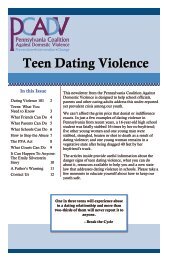Toolkit with Report Form - Pennsylvania Coalition Against Domestic ...
Toolkit with Report Form - Pennsylvania Coalition Against Domestic ...
Toolkit with Report Form - Pennsylvania Coalition Against Domestic ...
Create successful ePaper yourself
Turn your PDF publications into a flip-book with our unique Google optimized e-Paper software.
Section six<br />
Managing Communications<br />
The control, flow, and accuracy of information are critical to the credibility of<br />
your program, particularly when it is under public scrutiny for all manner of<br />
incidents, allegations, and circumstances. We offer the following tips to help<br />
you manage program communications:<br />
Be Clear on Your<br />
Program Policies/Practices<br />
◗ Program Standards<br />
◗ Non-Discrimination Standards/Practices<br />
◗ Conflict of Interest and Confidentiality<br />
Policies<br />
◗ Referral Process for Victims When You<br />
Cannot Provide Them With Services<br />
Make Sure Staff/Volunteers<br />
Are Trained and Practicing in<br />
Accordance <strong>with</strong> Program Policies<br />
◗ Training should be offered to all program<br />
staff and volunteers.<br />
◗ Program should regularly monitor to<br />
ensure that services are offered according to<br />
standards.<br />
◗ You may want to post information internally<br />
about your program policies and practices<br />
or create a fact sheet to be kept close to the<br />
phones.<br />
Train Staff/Volunteers Who<br />
Answer Hotline and Office Calls<br />
◗ Make sure they are sufficiently informed<br />
to respond to questions about services and<br />
shelter for all individuals seeking help.<br />
◗ Advise them not to get caught up in<br />
conversations about program policies. Have<br />
them transfer calls or refer callers to the<br />
designated spokesperson.<br />
◗ All answers should be consistent and reflect<br />
your program’s policies/practices.<br />
◗ <strong>Pennsylvania</strong> domestic violence programs<br />
provide services to all victims <strong>with</strong>out<br />
regard to age, race, creed, sex, ethnicity,<br />
color, national origin, marital status, sexual<br />
orientation, handicap or religion. It is never<br />
okay to state that your program does not<br />
serve or offer service to certain victims.<br />
◗ Guide staff on how to make responsible<br />
referrals.<br />
Keep Relevant Staff/<br />
Board/Volunteers Informed<br />
of Developing Issues<br />
Everyone needs to be on the same page<br />
and have the same information. Decide<br />
in advance who needs to know pertinent<br />
information and how it is communicated –<br />
email, memo, meeting.<br />
If Applicable, Share<br />
Information <strong>with</strong> Shelter Residents<br />
Don’t underestimate how swiftly information<br />
can spread throughout a shelter. If something<br />
is happening that residents are aware of or<br />
are likely to hear about, gather them together<br />
or reach out through support groups or house<br />
meetings to offer reassurance of their safety<br />
and confidentiality, and provide appropriate<br />
levels of information about whatever is<br />
happening.<br />
Keep PCADV Informed<br />
◗ Contact the Legal Department for issues of<br />
confidentiality and conflict of interest.<br />
◗ Contact the Contracts Department for issues<br />
relating to program services or complaints.<br />
◗ Contact the Communications Team for<br />
media response.<br />
page 38<br />
When Crisis Strikes | <strong>Pennsylvania</strong> <strong>Coalition</strong> <strong>Against</strong> <strong>Domestic</strong> Violence | 2012








